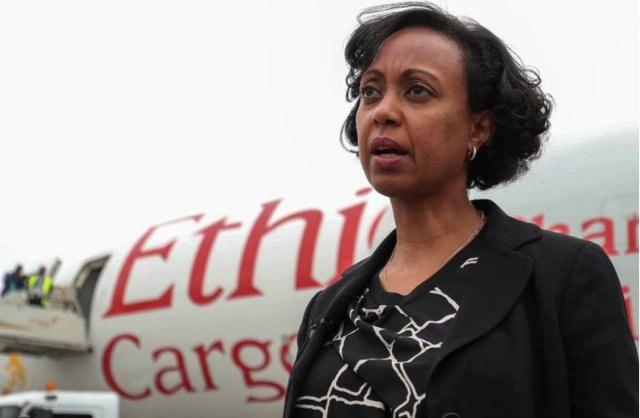 Health Minister Liya Tadesse monitors the unloading of medical donation from Chinese billionaire Jack Ma and Alibaba Foundation to Africa for coronavirus disease (COVID-19) testing, upon arrival at the Bole International Airport in Addis Ababa, March 22, 2020. (REUTERS/Tiksa Negeri)
Health Minister Liya Tadesse monitors the unloading of medical donation from Chinese billionaire Jack Ma and Alibaba Foundation to Africa for coronavirus disease (COVID-19) testing, upon arrival at the Bole International Airport in Addis Ababa, March 22, 2020. (REUTERS/Tiksa Negeri)
Lia Tadesse, Ethiopia’s new health minister, talks to the Thomson Reuters Foundation about the measures being rolled out to keep the country safe
Lia Tadesse became Ethiopia’s health minister in mid-March, a day before the East African nation registered its first case of the new coronavirus.
As the pandemic takes hold in Africa – Ethiopia has [398] cases and neighbouring Kenya more than 450 – Tadesse talked to the Thomson Reuters Foundation about the race to protect refugees, women and other vulnerable people from the virus.
Are you concerned that Ethiopia’s fragile health system could soon be overwhelmed?
If we get a lot of cases – and more severe cases – then that will definitely overwhelm the system. We are seeing this happen, not only in Ethiopia, but across the world.
We are preparing as best we can: increasing our intensive care unit capacity and dedicating more ventilators to treatment facilities in Addis Ababa and other regions.
The ventilators we have are still low in number – around 221 for COVID-19 – but we hope to get more soon.
We are working with countries to secure more aid.
Is there a risk that banning large gatherings and imposing social distancing will exacerbate social inequality?
While we’re trying to prevent COVID, we don’t want people to die of other problems. The government is preparing social protections.
Most businesses and major projects are continuing to sustain the economy and daily workers.
The government is supporting vulnerable people affected by the measures through distributing food across the country.
Is the deployment of thousands of female community health workers across the country to educate and screen individuals working?
It’s in progress. We only started this recently so we’re hoping it will really support our COVID response.
Early detection is a key point for the mitigation of the epidemic.
These health workers are wearing masks and gloves and doing house-to-house surveillance to identify possible symptoms like fevers and coughs and to establish people’s recent travel.
The health workers are also identifying people who have other illnesses but have not sought medical attention due to fears of the COVID epidemic.
Can girls and women still access sexual and reproductive health services?
Initially our communication was more focused on COVID-19 awareness but now we are also communicating key services like reproductive health.
Community health workers are ensuring that women are aware these services are available and that some like family planning can be accessed in their households.
Across the country we are educating about harmful practices like female genital mutilation and gender-based violence. It is a priority.
Are you concerned about Ethiopia’s ability to contain the disease in refugee camps?
Refugees and internally displaced people are one of the vulnerable populations we are looking at working with.
We are working with different partners like the Agency for Refugees and Returnees Affairs and the U.N.’s migration agency to ensure that these communities have the necessary health screening and that we are keeping them safe through measures like hand-washing.
This interview was shortened and edited for clarity.
—
Related:
Ethiopia Coronavirus Cases Surpass 270 (LATEST UPDATE)
COVID-19 and Its Impact on African Economies: Q&A with Prof. Lemma Senbet
Webinar on COVID-19 and Mental Health: Interview with Dr. Seble Frehywot
COVID-19: Interview with Dr. Tsion Firew, Ethiopian Doctor on the Frontline in NYC
Ethiopia COVID-19 Response Team: Interview with Mike Endale
Ethio-American Tech Company PhantomALERT Offers Free App to Track & Map COVID-19 Outbreak
‘Your Safety is Our Priority’: How Ethiopian Airlines is Navigating the Global Virus Crisis
Inspiring Amharic Poetry: A Reflection by Shimelis Amare (YouTube)
Getting Through COVID 19: ECMAA Shares Resources With Ethiopian Community
Maryland Issues COVID-19 Fact Sheet in Amharic for Ethiopian Community
Art in the Time of Coronavirus: Guide to Virtual Exhibitions from Ethiopia to U.S.
We Need Seismic Change, Right Now: by Marcus Samuelsson
City Sleeps: A Look At The Empty NYC Streets Amid The Virus – In Pictures
Ethiopia enforces 14-day quarantine for all travelers
Diaspora-based Tech Professionals Launch Ethiopia COVID-19 Response Task Force
Amid COVID-19 Pandemic Hopeful & Inspiring Stories Shared by Obama
Pleas to Diaspora to Assist Coronavirus First Responders in Ethiopia
Coronavirus Sparks an Epidemic of People Helping People in Seattle
Join the conversation on Twitter and Facebook.

























